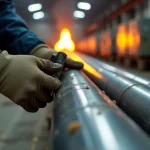AI Integration in UK Manufacturing
Artificial intelligence is revolutionising UK manufacturing by embedding automation and robotics across factory floors. AI in manufacturing UK is a cornerstone of Industry 4.0, enabling seamless integration between physical equipment and digital systems. This fusion drives not only efficiency but also precision in production processes, minimising human error and downtime.
Among the most transformative innovations are digital twins—virtual replicas of physical assets—that allow manufacturers to simulate and optimise operations before deploying real-world changes. Coupled with predictive maintenance powered by AI algorithms, factories can anticipate equipment failures, reducing costly unplanned stoppages and extending machinery lifespan.
Also read : How Can Emerging Technologies Impact the UK’s Future Economy?
The shift toward smart automation has a direct impact on the UK manufacturing workforce. While some routine jobs evolve or become obsolete, new roles demanding advanced technical skills and data literacy emerge. This transition boosts overall productivity by combining human insight with real-time AI analytics, fostering a dynamic yet efficient manufacturing environment. Embracing AI in manufacturing UK therefore not only accelerates production capabilities but also reshapes skills development and operational strategies.
AI Integration in UK Manufacturing
AI in manufacturing UK advances through widespread adoption of automation and robotics directly on factory floors. Smart automation systems now perform repetitive tasks with greater speed and accuracy, allowing human workers to focus on higher-level decisions. This shift is a vital element of Industry 4.0, where interconnected devices, sensors, and AI algorithms work in unison to streamline production.
Also read : How are UK policies influencing tech industry growth?
A key example is the use of digital twins, which provide real-time virtual models of physical machinery. These enable manufacturers to test changes without disrupting actual operations, enhancing decision-making and reducing risk. Similarly, predictive maintenance uses AI to analyse sensor data, predicting equipment failures before they occur. This minimizes downtime, lowers maintenance costs, and improves asset utilization.
The workforce experiences a significant transformation as roles evolve to integrate AI tools. New jobs demand proficiency in data analytics, robotics operation, and AI system management, expanding skills beyond traditional manufacturing tasks. This collaborative human-AI interaction boosts overall productivity, combining AI’s precision with human expertise for smarter, more adaptable manufacturing processes.
AI Integration in UK Manufacturing
The rise of automation and robotics significantly advances AI in manufacturing UK, ushering in a new era aligned with Industry 4.0 principles. On factory floors, robotics perform repetitive and precise tasks with speed and consistency, reducing human error and boosting throughput. These systems enable manufacturers to maintain high quality while cutting production times.
A key AI innovation is the use of digital twins, virtual models that mirror real equipment and processes. For example, UK manufacturers deploy digital twins to simulate assembly lines and test adjustments before physical implementation, avoiding costly disruptions. Predictive maintenance complements this by analysing sensor data to forecast machinery failures, allowing timely repairs that minimise downtime.
AI in manufacturing UK also influences workforce dynamics. Automation handles mundane duties, freeing employees to focus on complex problem-solving and system oversight. This shift increases demand for skills in data analysis, AI tool management, and technical maintenance. Consequently, productivity gains stem not only from machines but from a more skilled, adaptable workforce integrated with AI-powered insights. This synergy defines the evolving landscape of UK’s manufacturing sector under AI integration.
AI Integration in UK Manufacturing
The adoption of automation and robotics in UK manufacturing is a critical driver of Industry 4.0’s evolution. On factory floors, AI in manufacturing UK enables machines to perform repetitive tasks with greater speed and precision than human operators. Robotics systems are now seamlessly integrated with AI software, allowing for adaptive responses to changing production demands without constant human intervention.
A prime illustration is the use of digital twins—virtual models of factory equipment that simulate processes in real time. This technology helps manufacturers optimise workflows and predict maintenance needs. Predictive maintenance is another AI application gaining momentum, where sensor-collected data feeds algorithms that forecast equipment failures before they disrupt production. Reducing unexpected downtime is essential for maintaining the supply chain’s reliability.
Adopting these AI-driven technologies reshapes workforce skills. The demand shifts towards employees capable of managing and interpreting AI systems, fostering new roles centred on data analytics and robotics oversight. Overall, AI integration not only boosts manufacturing productivity but also catalyses a workforce transformation aligned with the digital future of UK industry.
AI Integration in UK Manufacturing
The ongoing adoption of automation and robotics is driving rapid advancement in AI in manufacturing UK. Factory floors now leverage smart automation systems to execute repetitive tasks with increased speed and precision, directly improving operational efficiency and product quality. This trend aligns closely with Industry 4.0, which focuses on interconnected and intelligent manufacturing environments.
Two standout AI applications exemplify this integration: digital twins and predictive maintenance. Digital twins create highly detailed virtual replicas of physical equipment, enabling manufacturers to simulate and optimise processes without halting production. Predictive maintenance uses AI algorithms to analyse sensor data, identifying potential equipment faults early and scheduling timely repairs. Together, these technologies reduce downtime and maintenance costs while maximising asset utilisation.
This transformation also reshapes workforce skills and productivity. Automation handles routine operations, shifting human roles toward monitoring AI systems and performing complex problem-solving. Consequently, demand grows for data literacy and technical expertise in AI tool management. The integration of AI in manufacturing UK promotes a productive synergy between human workers and intelligent machines, driving efficiency gains across the sector.
AI Integration in UK Manufacturing
In UK manufacturing, automation and robotics are now essential to Industry 4.0, fundamentally changing production lines. Robotics systems automate repetitive tasks with unmatched speed and precision, reducing human error while increasing output consistency. Factories deploy AI-driven automation not simply to replace manual labour, but to integrate intelligent decision-making within processes, adapting rapidly to variations in demand or production needs.
For example, digital twins create precise virtual models of equipment and factory floors, allowing manufacturers to simulate changes and identify inefficiencies without physical disruptions. Predictive maintenance further enhances operational reliability by analysing machine sensor data to forecast failures and schedule timely repairs, cutting unexpected downtime.
This shift also transforms workforce roles. Employees increasingly require skills in managing AI systems, robotics operation, and data analytics. The workforce adapts by blending human expertise with AI capabilities, driving productivity improvements across the sector. Overall, AI in manufacturing UK accelerates efficiency through smart automation, while fostering a skilled workforce prepared for technologically advanced operations.




